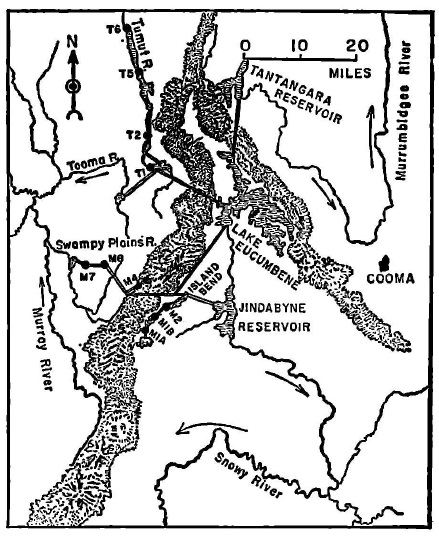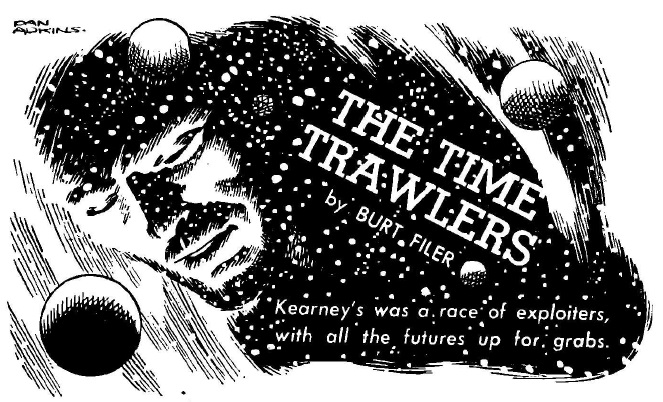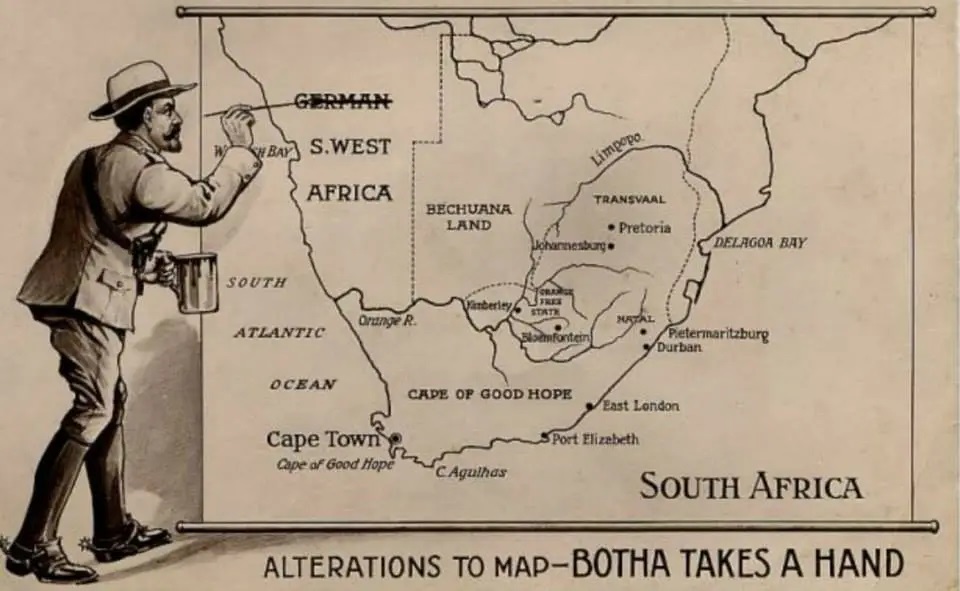
by Gideon Marcus
Not F-UN
Bjo Trimble, a superfan from the wayback, put together a fan shindig in Los Angeles last weekend. Called F-UN Con, it is not only an SF convention, but it's also the first Star Trek convention, with a whole day of programming dedicated to the show.
This article is not about F-UN Con.
Why did we fly to the Bay Area this past weekend rather than trundling up to L.A., which is closer? Well, we know the gang in 'Frisco, and they've been putting together informal conclaves every year. We couldn't very well shuck tradition just for a new event, even if it's nominally in our back yard.
It was a good decision. For one thing, they had a bit of Star Trek up there–this lovely reproduction of the captain's chair.

And now that The Prisoner is showing in the States, we're getting some lovely costumage, too!

Speaking of traditions that are worth upholding, the latest issue of Galaxy feels like a return to the quality of yore. Usually, magazines pack their summer issues with their least impressive offerings, but such was not the case this time around. Take a trip with me!

by Vaughn Bodé
Among the Bad Baboons, by Mack Reynolds

by Vaughn Bodé
Mack Reynolds continues his stories of life under "People's Capitalism" in the '80s, this time focusing on the last of the Bohemians, living in the decaying ruins of Greenwich Village. With most of the country now on the dole, and white flight having been taken to its logical extreme, the cities are now all but abandoned, save for the "babboons"–lawless squatters–and the "hunters", who go downtown to shoot for thrills.
This story is more a vehicle for philosophical discussion than plot, and I found the end a bit distasteful. That said, there are some fascinating suppositions in this tale. One is that the current regime, in which prospective authors send their manuscripts to editors, who then publish them through traditional channels, will be supplanted by a revolutionary new process. In the '80s, any author can take their novel (or story, or artwork) to a computer and have it stored for infinite reproduction. These reproductions can then be read on a tv-phone (or in the case of art, facsimile duplicated).
This means that anyone can be a writer or an artist, and anyone can appreciate any work, any time. And since everyone is on the dole anyway, why not be an artist or a writer? Well, it does mean there's a lot more competition, and it's harder to become a phenomenon, but on the other hand, there's no barrier to entry.
Now, Reynolds assumes most people won't want to be artists, and they will be content to watch 24 hours of television a day while tranked up on cheap drugs. Maybe he's right. But as someone who already publishes nontraditionally (what is Galactic Journey and The Fantasy Amateur Press Association if not decentralized publishing), it's an exciting prospect.
Three stars, for the ideas, if anything.
Going Down Smooth, by Robert Silverberg

by Brock
Silverbob puts on his best Ellison impression with this tale of a therapist computer gone nuts listening to neurotic patients all day.
It's not bad, but it doesn't go anywhere. I'd stick with the original.
Three stars.
A Specter is Haunting Texas (Part 2 of 3), by Fritz Leiber

by Jack Gaughan
I really had not been looking forward to this second installment of Leiber's tale. Last time, as you recall, a spaceman-actor had landed in post-apocalyptic Texas (now ruler of all North America save the two Black republics in the southwest and southeast) to 1) perform in a short tour and 2) make good on a pitchblende claim in the Yukon. The eight-foot tall, cadaverous, cybernetic thespian was recruited in a hit on the current President of Texas, whereupon he escaped to join causes with the revolutionary Mexican underclass.
It was all a bit silly, and while I appreciated what Leiber was doing, it didn't quite resonate with me. This time, however, the needle fell into the groove. As Chris Crockett La Cruz assumed the role of La Muerta, spurring the downtrodden Mexicans with promises of Vengeance and Death, Leiber's writing took on sublime proportions. The way he navigates the line between satire and seriousness so deftly, with such beautiful language and characterization, even as the characters are all caricatures, is an accomplishment for the ages.
Five stars for ths installment.
For Your Information: In Australia, the Rain …, by Willy Ley

The topic for this month's non-fiction piece is an interesting one: the artificial lakes, rivers, and resulting hydropower systems of Australia. The presentation, however, leaves much to be desired. I want to know the impact of these developments, both on settlement and on the environment, not be given pages of details of their precise geographical location.
Three stars.
The Time Trawlers, by Burt K. Filer

by Dan Adkins
A thousand years from now, humans will fish the future just as they now fish the seas. As the solar system's population grows to number into the quadrillions, our race must pluck planets from 30 billion A.D. to plunder them for their resources. An 18-year old fisherman with "the knack" for finding rich worlds, decides he doesn't want to do it anymore after seeing what the process does to already-inhabited planets. He embarks on a one-man crusade against the practice, hatching a novel scheme to bring it to an end.
Never mind the silliness of the premise, or the fact that culture looks pretty much like 20th Century Earth in the tale. It's a good story, well-told. Sure, it feels a bit like early vintage Galaxy, but I like that era!
Four stars.
The Star Below, by Damon Knight

by Jack Gaughan
Thorinn, that diminutive traveler introduced in The World and Thorinn and later in The Garden of Ease, has returned. This time, he has stumbled across an enormous warehouse filled with all manner of wondrous items. From rich garments to strange engines to a talking box, all are marvels to the medieval-minded explorer.
Of course, it's at this point that our suspicions are confirmed that the myriad of worlds Thorinn passes through are all parts of a giant generation ship, this being the cargo hold. What makes this segment so compelling is the description of these (to us) more-or-less familiar items to a man with no conception of technology. The interactions between Thorinn and the little computer, particularly the way the box learns English, feel very natural. I only wish Thorinn could have taken the box with him; it'd make an interesting companion.
Four stars.
HEMEAC, by E. G. Von Wald

by Joe Wehrle
Long ago, the robots took over the human power plants, and they also claimed a number of human hostages, who they began to educate in their own, logical images. But the robots are breaking down, and the "renegade" humans are pounding at the gates.
What is HEMEAC, a teenaged robot-trained youth supposed to think when his teachers all start behaving erratically and the wild people defile the sacred halls of cybernia?
This is another tale with a classic (i.e. '50s) sense to it. I particularly enjoyed the rendering of the robots, and HEMEAC's not-entirely-successful attempts to make rigid his thought processes.
Four stars.
Missed it by THAT much
Put it all together, and you get an issue that soars almost to four stars in quality–surely to contend for the best magazine of the month. It's reads like this that keep me going, and also cause me to commend editor Pohl for keeping the proud publication on an even keel. I know some disagree with his lambasting of the New Wave (and, indeed, Pohl is not averse to printing examples of it), but I think there is value to the continued production of novel, interesting, but also conventional SF prose.
I can't wait for next month!
 </small
</small

 Red Guard rebels march in Shanghai last year.
Red Guard rebels march in Shanghai last year. Those are supposed to be radiators, not rocket thrusters. Art by McKenna
Those are supposed to be radiators, not rocket thrusters. Art by McKenna
![[August 2, 1968] Dreams and Nightmares (September 1968 <i>IF</i>)](https://galacticjourney.org/wp-content/uploads/2023/07/IF-1968-09-Cover-672x372.jpg)
![[July 10, 1968] Back in the Saddle Again (August 1968 <i>Galaxy</i>)](https://galacticjourney.org/wp-content/uploads/2023/07/680710cover-672x372.jpg)












![[July 2, 1968] What’s the Point? (August 1968 <i>IF</i>)](https://galacticjourney.org/wp-content/uploads/2023/06/IF-1968-08-Cover-505x372.jpg)
 A political cartoon from after the First World War.
A political cartoon from after the First World War. Sam Nujoma (r.), President of SWAPO, shakes hands with Mostafa Rateb Abdel-Wahab, President of the Council for Namibia
Sam Nujoma (r.), President of SWAPO, shakes hands with Mostafa Rateb Abdel-Wahab, President of the Council for Namibia Supposedly for Rogue Star, which doesn’t have a starship crash. Or this many characters. Art by Chaffee
Supposedly for Rogue Star, which doesn’t have a starship crash. Or this many characters. Art by Chaffee![[June 2, 1968] Necessary Evils (July 1968 <i>IF</i>)](https://galacticjourney.org/wp-content/uploads/2023/05/IF-1968-07-Cover-543x372.jpg)
 The Baltimore Nine shortly after their arrest. Fr. Philip Berrigan is 2nd from the left in the back row.
The Baltimore Nine shortly after their arrest. Fr. Philip Berrigan is 2nd from the left in the back row.
 Abbott and his men are the first to reach the Sleeper’s chamber. Art by Gray Morrow
Abbott and his men are the first to reach the Sleeper’s chamber. Art by Gray Morrow![[May 2, 1968] The Thing with Feathers (June 1968 <i>IF</i>)](https://galacticjourney.org/wp-content/uploads/2023/04/IF-Cover-1968-06-672x372.jpg)
 l. New Governor-General Banja Tejan Sie. r. New Prime Minister Siaka Stevens.
l. New Governor-General Banja Tejan Sie. r. New Prime Minister Siaka Stevens. No one has ever seen the prison of Brass from the outside. Art by Vaughn Bodé
No one has ever seen the prison of Brass from the outside. Art by Vaughn Bodé![[April 2, 1968] Asking the big questions (May 1968 <i>IF</i>)](https://galacticjourney.org/wp-content/uploads/2023/03/IF-1968-05-Cover-569x372.jpg)
 Alexander Dubček addresses the nation after taking office.
Alexander Dubček addresses the nation after taking office. Supposedly for Dismal Light, which doesn’t even have two male characters. Generic art by Pederson
Supposedly for Dismal Light, which doesn’t even have two male characters. Generic art by Pederson